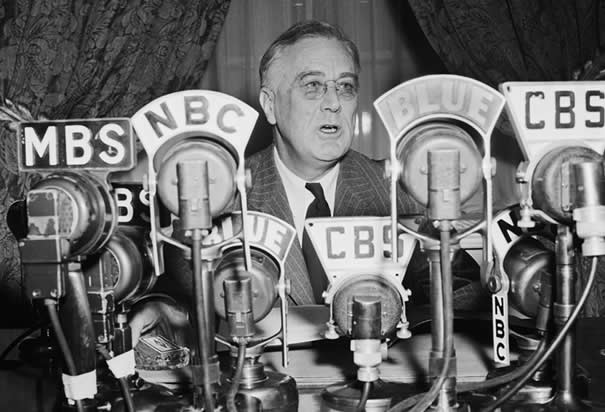James Fly was a top attorney for the Tennessee Valley Authority (TVA) from 1934 to 1939 and the chairman of the Federal Communications Commission (FCC) from 1939 to 1944 [1]. Described as a “tenacious and devout New Dealer,” his FCC set out to “diminish the concentrated monopolistic power that controlled the broadcasting industry and simultaneously encourage competition” [2].
James Lawrence Fly was born in Seagoville, Texas on February 22, 1898, to Joseph Lawrence and Jane Ard Fly. He graduated from Dallas High School in 1916 and from the Naval Academy in 1920. After serving three years in the Navy he married Mildred Marvin Jones (they would have two children, James Lawrence, Jr. and Sara Virginia) and began attending Harvard Law School. After receiving his law degree and being admitted to the bar in 1926, Fly began his legal career with the New York firm of White & Case. By 1929, he was working as an assistant U.S. attorney general, specializing in anti-trust law [3].
After Fly became head of the TVA’s legal staff, he twice defended the Tennessee Valley Authority Act before the U.S. Supreme Court – and won both times [4]. Wendell Wilkie, a major opponent of public utilities (and the 1940 Republican challenger to Roosevelt’s third term), described Fly as “the most dangerous man in the United States – to have on the other side” [5].
As chairman of the FCC, Fly oversaw the licensing of radio operators; the enforcement of laws and regulations in communications; radio and atmospheric research; and, most importantly, the issuing of bandwidth frequencies to the burgeoning communications market [6]. He was “credited with greatly improving efficiency,” but he made enemies “by refusing to indulge in backslapping either within the Government or the radio industry” [7]. Fly’s firm regulatory approach “startled and angered the broadcasting industry and their politically conservative defenders in Congress” [8] and his opposition to wiretapping angered the Department of Justice [9].
Fly’s hard-nosed approach did not seem to bother President Roosevelt. When Fly resigned from the FCC in 1944, the president commended his many years of public service and asked for his continued help: “You have given five years to the prosecution of monopolies… five years to your brilliant defense of the Tennessee Valley Authority… and five years to the reorganization of the Federal Communications Commission… These were all extraordinarily difficult tasks—calling for technical competence and strength of heart of the highest order—against powerful opponents who did not always take your victories lightly… I shall want your advice and counsel. You are only on furlough” [10].
After his New Deal service, Fly returned to private practice and then became a director in the American Civil Liberties Union. He died on January 6, 1966, at the age of 67 [11]. Today, the TVA still provides affordable power to millions of Americans, thanks in part to the legal work of James Fly.
Sources: (1) “Fly Named To FCC As M’Ninch Quits,” New York Times, July 28, 1939, and “Fly Leaves The FCC For Law Practice,” New York Times, November 14, 1944. (2) Susan L. Brinson, The Red Scare, Politics, and the Federal Communications Commission, 1941-1960, Westport, CT: Praeger Publishers, 2004, p. 25-28. (3) “Fly Named To FCC As M’Ninch Quits,” New York Times, July 28, 1939; “James L. Fly Dies, Ex-Head of FCC,” New York Times, January 7, 1966; the names of Fly’s children are from his Wikipedia page (accessed January 29, 2016), citing, “We Pay Our Respects To— James Lawrence Fly,” Broadcasting and Broadcast Advertising (Washington, D.C.: Broadcasting Publications, Inc.) 21 (24): 39. December 15, 1941. (4) See, e.g., Tennessee Electric Power Co., et. al. v. Tennessee Valley Authority, et. al., 306 U.S. 118 (1939), Cornell University Law School, https://www.law.cornell.edu/supremecourt/text/306/118, accessed January 29, 2016, and “Fly Named To FCC As M’Ninch Quits,” New York Times, July 28, 1939. (5) “James L. Fly Dies, Ex-Head of FCC,” New York Times, January 7, 1966. (6) See our summary of the Communications Act of 1934, at https://livingnewdeal.org/what-was-the-new-deal/programs/. (7) See note 5. (8) See note 2. (9) See, e.g., “Fly Of FCC Opposes Wiretapping Power,” New York Times, May 20, 1941. (10) “Fly Leaves The FCC For Private Law Practice,” New York Times, November 14, 1944. (11) See note 5.
